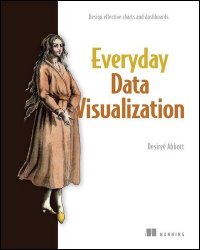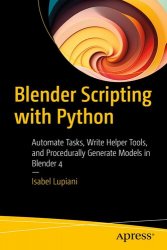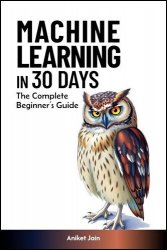 Название: Everyday Data Visualization: Design Effective Charts and Dashboards (Final Release)
Название: Everyday Data Visualization: Design Effective Charts and Dashboards (Final Release)Автор: Desiree Abbott
Издательство: Manning Publications
Год: 2024
Страниц: 264
Язык: английский
Формат: epub (true)
Размер: 32.4 MB
Radically improve the quality of your data visualizations by employing core principles of color, typography, chart types, data storytelling, and more.
Everyday Data Visualization is a field guide for design techniques that will improve the charts, reports, and data dashboards you build every day. Everything you learn is tool-agnostic, with universal principles you can apply to any data stack.
In Everyday Data Visualization you’ll learn important design principles for the most common data visualizations:
Harness the power of perception to guide a user’s attention
Bring data to life with color and typography
Choose the best chart types for your data story
Design for interactive visualizations
Keep the user’s needs first throughout your projects
This book gives you the tools you need to bring your data to life with clarity, precision, and flair. You’ll learn how human brains perceive and process information, wield modern accessibility standards, get the basics of color theory and typography, and more.
About the Technology
Even mundane presentations like charts, dashboards, and infographics can become engaging and inspiring data stories! This book shows you how to upgrade the visualizations you create every day by improving the layout, typography, color, and accessibility. You’ll discover timeless principles of design that help you highlight important features, compensate for missing information, and interact with live data flows.
Popular tools for data visualizations:
Spreadsheet: Excel
BI tools: Tableau, Power BI
Code: D3 (aka D3.js or d3 or d3.js), Python, R, ggplot, ggplot2, Plotly, Java
Design software: Illustrator
Other: Pen & Paper, Mapbox, PowerPoint
One of the most popular and powerful data visualization libraries for jаvascript is the free and open-source d3.js, also known as D3 or d3, which stands for “Data-Driven Documents.” If jаvascript and its asynchrony aren’t your jam, perhaps you’d prefer Python or R. While Python is an entire programming language, and R is a software environment specifically made for statistical analysis, both are free and open source, have a cult-like following among coders, and are great for data viz practitioners. I’m in Camp Python myself, as that’s what I started using in my undergraduate physics courses a hundred years ago, even though I’ve dabbled a little bit with R in the interim. Both R and Python have very friendly and approachable syntax, hence their considerable popularity. If you’re a statistician or data scientist, you probably already know R, and if you’re not, I’d wager you’d prefer Python. As for libraries to use in each, R users adore their ggplot/ggplot2 and Shiny, while Python users have many other options, including Seaborn, Plotly, and Matplotlib.
About the Book
Everyday Data Visualization guides you through basic graphic design for the most common types of data visualization. You’ll learn how to enhance charts with color, encourage users to interact and explore data and create visualizations accessible to everyone. Along the way, you’ll practice each new skill as you take a dashboard project from research to publication.
What's Inside
Bring data to life with color and typography
Choose the best chart types for your data story
Design interactive visualizations
about the reader
For readers experienced with data analysis tools.
about the author
Desireé Abbott has over a decade of experience in product analytics, business intelligence, science, design, and software engineering.
Скачать Everyday Data Visualization: Design Effective Charts and Dashboards (Final Release)
[related-news] [/related-news]
Комментарии 0
Комментариев пока нет. Стань первым!















